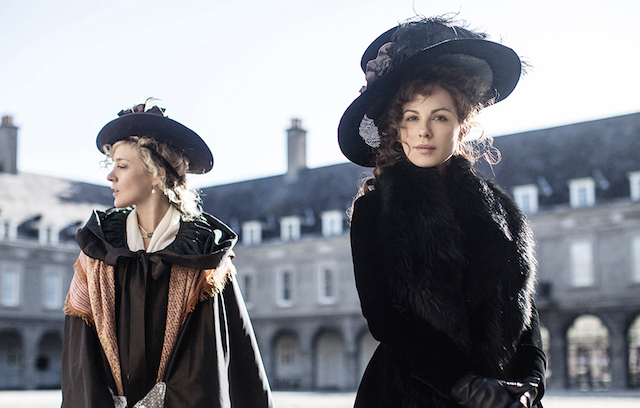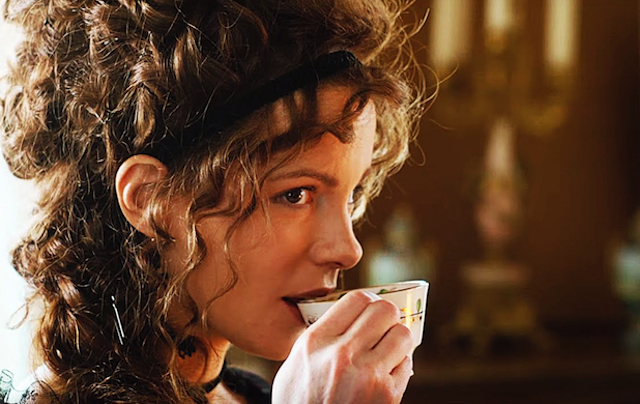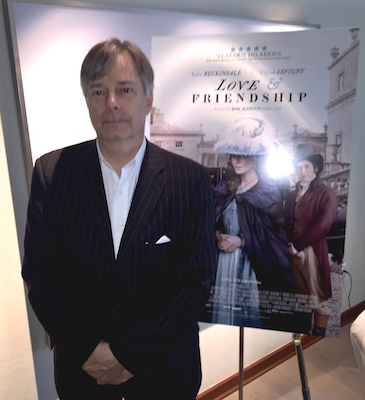CHICAGO – In anticipation of the scariest week of the year, HollywoodChicago.com launches its 2024 Movie Gifts series, which will suggest DVDs and collections for holiday giving.
Interview: Director Whit Stillman Celebrates ‘Love & Friendship’
- Adam Clayton Powell
- Barcelona
- Castle Rock
- Chloe Sevigny
- Damsels in Distress
- HollywoodChicago.com Content
- Interview
- Jane Austin
- Jemma Redgrave
- John F. Kennedy
- Kate Beckinsale
- Lady Susan
- Last Days of Disco
- Love & Friendship
- Metropolitan
- Patrick McDonald
- Roadside Attractions
- Stephen Fry
- Whit Stillman
- Xavier Samuel
CHICAGO – Say the name Whit Stillman in certain cinema circles, and a rush of admiration soon follows. The director made a name for himself with his debut film “Metropolitan’ (1990), and followed with the same emotional pallette in “Barcelona” (1994). He is back with an adaptation of a Jane Austin novel, entitled “Love & Friendship.”
The title is taken from one of Jane Austin’s short stories, but the narrative is from her novel “Lady Susan,” published 60 years after her death. It involves the title character (portrayed in the film by Kate Beckinsale), a widow without fortune, who is looking to marry again to wealth, and wishes the same for her daughter. She visits the estate of her sister-in-law and brother-in-law – Charles and Catherine Vernon – in the hopes of making a match for her lovely child Frederica, or at least herself.

Chloë Sevigny and Kate Beckinsale in ‘Love & Friendship’
Photo credit: Roadside Attractions
One of the reasons Stillman’s film “Metropolitan” struck such a chord, is that it was a glimpse into the young society types that he knew in New York City. His ancestors were historically significant, and his politically connected father served in the John F. Kennedy administration. After graduating Harvard in 1973, Stillman worked in journalism and film distribution, representing Spanish language films for the U.S. markets (experiences which were later woven into “Barcelona”). After “Last Days of Disco” in 1998, it wasn’t until 13 years later that “Damsels in Distress” was released. “Love & Friendship” is his fourth film, and his first adaptation from another source.
Whit Stillman was interviewed by HollywoodChicago.com last month in anticipation of the Chicago debut of “Love & Friendship” on May 20th, 2016. The eclectic and mysterious director is as smart and philosophical as his quick-witted films.
HollywoodChicago.com: This is a comedy of manners…
Whit Stillman: I have to stop you right there. We had [actor] Stephen Fry on the set for one day, when he did his role, and he agreed to sit down for an interview about Jane Austin. He finally solved this terminology regarding ‘comedy of manners.’ He said it came from Latin, and the word is ‘moralis.’ So appropriately, it’s a comedy of morals. The word manners, for our culture, has been ruined by Emily Post – we think of manners of folding napkins, or which fork to use. So I like the term ‘comedy of morals’ better.
HollywoodChicago.com: Okay, that’s been a theme in your previous films. What fascinates you about the notion of clinging to something that people think defines their civilization?
Stillman: I’m for people clinging. I’m pro-clinging. [laughs] Our roots are clinging, we shouldn’t knock down so many old ‘buildings.’
HollywoodChicago.com: Often when people hear the name ‘Jane Austin’ they immediately thing of something that is outside their realm, or stuck in another time they don’t understand. How did you want to revive her, especially in the emphasis on her humor?
Stillman: She is brilliant, and her work is timeless. She was at the beginning of something, and when that happens I think the work tends to be more timeless. She began the novel as we know it, and somehow her novels are enduring, more so than subsequent novels of the same era. For example, I think Austin is read more now than Charles Dickens, and Dickens was much more popular in his day. She endures because of her classicism.
What I noticed when I adapted her works, is exactly what you see in the surface of her novels – the delightful delineation of characters and situations – but I also think in her work there are deep currents of story that are everlasting, and really work. In adaption, I found a strength and power that was really surprising. It was great to be able to work with what she created.
HollywoodChicago.com: One of the careful considerations for this film was casting. You cast two of the actresses from ‘Last Days of Disco,’ that you produced 18 years ago. What did you find out about Kate [Beckinsale] and Chloë [Sevigny] as actors that you didn’t see in the previous production?
Stillman: They have both become superb professionals. I did have a great experience with them in ‘Last Days of Disco,’ but for ‘Love & Friendship’ they were sensational. We had to work very quickly, but finished in 26 days on a 27 day schedule, because they – and everyone else – was so dedicated and so prepared when they came on the set. It was marvelous.
HollywoodChicago.com: You mentioned that this was the experience of all the actors?
Stillman: Yes. One of the problems of a director on the set is that we become overwhelmed by all the factors and threads of production, that sometimes we can’t focus on our main job, which is steering the performances to create the whole film. I remember watching an early scene, with Sir Reginald [Xavier Samuel] and Lady DeCourcy [Jemma Redgrave], and they crossed over and held hands. That was a total surprise to me – it’s the great stuff that actors add that I’m barely aware of on set. Experienced actors take the reins, and do what those characters do.
The overall reaction afterward was they enjoyed the shoot, because with a 26 day schedule, we were racing through these scenes. It becomes a lot better for the actors when we’re ‘shooting, shooting, shooting,’ instead of waiting around in a trailer for something to happen.

Kate Beckinsale is the Sensible Schemer in ‘Love & Friendship’
Photo credit: Roadside Attractions
HollywoodChicago.com: What was most daunting about keeping the story true to its period – even though this was stuck in certain era, it felt modern. What was the challenge of keeping the powdered wigs, horse-drawn carriages and excessive fashions in the background of the story, while maintaining the character of the era?
Stillman: It does seem daunting, doesn’t it? People talk about that all the time, and yes, hair and wigs were really worrisome. But everything else was fairly easy to solve and fix. There are tons of professionals to help out, and everybody is geared up to do their best job. It fell into place easily, and gave me a wonderful visual texture. It was a lower budget film, but we had a location where every room already looked great.
HollywoodChicago.com: At this point in your life, what is you feeling about your family’s connection to politics and history. What was your father’s attitude, for example, on the assassination of his friend and colleague John F. Kennedy, and how did it affect his worldview, and thereby your worldview, afterward?
Stillman: It was devastating for my father, and I think it eventually broke up my parent’s marriage, which led to a bad period for my family. It killed my father’s political ambitions. He tried to continue after the assassination, but Lyndon Johnson eventually got rid of all the Kennedy people. It was very depressing for him, because no one would tell him why he didn’t have a job.
It was short-sighted on Johnson’s part, because he disenfranchised all the Kennedy-ites and East Coast liberals, so when [Senator] Eugene McCarthy challenged his presidency regarding the Vietnam War, there was all this dry tinder of disenfranchised Kennedy people, and they all joined the 1968 Bobby Kennedy campaign.
HollywoodChicago.com: And that campaign was over when Bobby Kennedy was assassinated.
Stillman: 1968 was a very bad year, with Dr. Martin Luther King and Bobby’s assassinations, it was nightmare. My father and I came to Chicago for the Democratic convention, because he was an alternate delegate for Senator George McGovern. We were staying at the Hilton Hotel, and all the violence was outside the hotel. It was an emotional experience.
HollywoodChicago.com: What do the John F. Kennedy insiders think about the various theories on his assassination?
Stillman: We hate it. We hate all the nonsense. I was outraged by the Oliver Stone film, which is a horrible travesty. Everyone that was a Kennedy insider hated that film. I think it also affected my professional career. At one point I was thinking of casting Helena Bonham Carter in a film, and she had just portrayed Marina Oswald [wife of Lee Harvey] in a TV movie, and she was filled with all the conspiracy theory nonsense. I felt shy and nervous around her anyway, and I thought a way to get around this was to get into a tense debate with her about the JFK assassination. A nightmare like that leads to so many nightmares. It doesn’t end, it had so many consequences.
HollywoodChicago.com: Besides the Kennedy connection, do you have any anecdotes that illustrate your father’s interaction with U.S. History?
 Whit Stillman, Director of ‘Love & Friendship’ Photo credit: Patrick McDonald for HollywoodChicago.com |
Stillman: I was just thinking about my favorite story this morning. It was about Adam Clayton Powell Jr. [the fourth African-American in history to be elected to Congress]. My father ran his congressional campaign in 1960. Powell came up to my father at some state convention and said, ‘John, you and I, as minorities, should stick together.’ And my father was a bit taken aback and asked, ‘what minority is that?’ And Powell replied, ‘The Protestant minority in the Democratic Party.’ [laughs] In New York State in those days, all the Democrats were Catholic or Jewish.
HollywoodChicago.com: One of the true fascinations for me, in regard to your film ‘Metropolitan,’ was its glimpse into a world that I knew existed, but never understood. In the process of building that story, what did you begin to understand about your life at that time that seemed so simple, but was clouded when you actually went lived it in the era?
Stillman: I don’t know if it became clear to me while I was building the film, but it has become clear in the years since its release. It was just that I happened to fall into a group of very funny people. It was a bit like living in a funny Jane Austin novel, I was given funny material.
The real person who inspired Nick Smith [Chris Eigeman] in the film, he subsequently became my favorite newspaper columnist in New York City. In the New York Times, he did an architectural column called ‘Cityscapes.’ It was a column about the history of New York buildings, and it just was the most interesting column. Since then, I found that many of the things the people in the film were talking about, they later became. I was lucky to have known them.
HollywoodChicago.com: You had a period between ‘Last Days of Disco’ and ‘Damsels in Distress’ in which your screenplays were not being produced. What was the most difficult time during that period, and when were you able to take the bull by the horns, which led to ‘Damsels’?
Stillman: I don’t know what happened to me in my London period. I had this notion that I could live in Paris, and take the train to London to produce my films. In many ways, especially critically, I was treated well in London, and I would get these commissions to develop scripts. But I couldn’t get the films off the ground, and there were a lot of humiliations, and a lot of things turned bad at once.
It took coming back to Los Angeles, and talking to my friends at Castle Rock [production company of Rob Reiner], and at the time it was run by Martin Shafer and Liz Glotzer. I told Liz about this idea of girls with floral names at a mythical college, trying to find the right perfume. The loved the idea, and gave me the commission. This was right in the midst of ‘mumblecore’ [independent film movement], and when they produced it, it became a way to get my feet back on the ground.
HollywoodChicago.com: How did you get Greta Gerwig involved?
Stillman: Actually it was the Criterion Collection [art film DVD distributors] that helped me a lot. They had Chloë, Chris and I do the narration for the narrative track for ‘Last Days of Disco.’ Thanks to them, the Lincoln Center programmed a screening of the film at their theater. Greta Gerwig came and saw it, and became a fan. So when we were casting ‘Damsels in Distress,’ she was really interested in the project, thanks to that screening. It was one thing that led to another.
HollywoodChicago.com: Since you’ve commented on your era so profoundly, what do you think people born in the early 1950s learned about American that people born in subsequent decades never have learned?
Stillman: I don’t think so highly of my generation, so I’m not really sure about that question. We learned some bad things, and the Vietnam War led to some bad conclusions. We’re not the greatest generation, that’s for sure. In my father’s time – he was in college during many transitions in the late 1930s – they had great institutional loyalties…to his college, eventually the navy, the Democratic Party and certain ideals of our country. Those are the things that became broken with my generation.
 | By PATRICK McDONALD |


